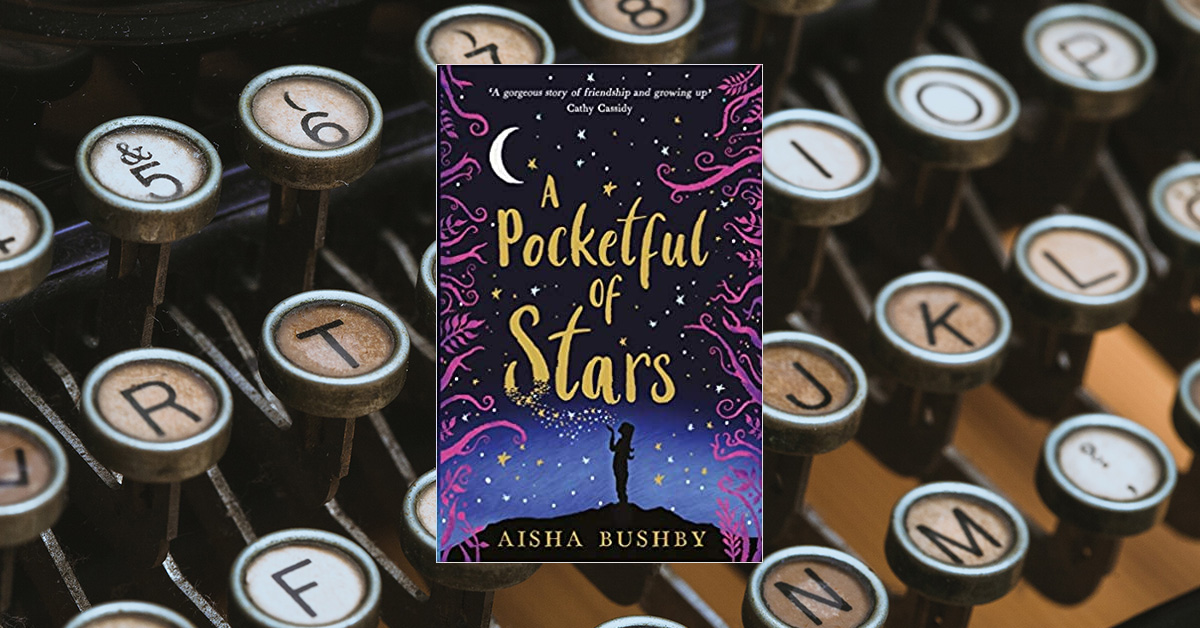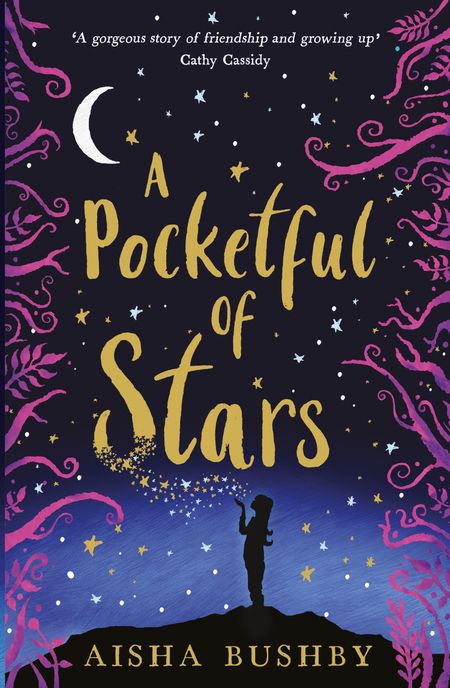Aisha Bushby, the author of A Pocketful of Stars, took to our website with a very special feature detailing her writing process, and showing us what goes into drafting her sequel.
Drafting is one of the best and yet most difficult stages of writing a novel. Probably because, no matter how many times you’ve done it, it still feels like starting again each time. I’m already having a wildly different experience with my second novel, and so my focus isn’t to find one way to write, but to try and pick out a routine for myself that works no matter what sort of writing journey I’m having.
To do that, I decided to record three days of my drafting journey, with tips I discovered along the way. It was a really great way for me to understand my personal process, and I hope it helps you too!
But, before I get into that, it’s worth talking about how I plan and prepare to draft. (Very sporadically, if you’re wondering).
How I plan a book in three (not-so-easy) steps:
- Once I have an idea that I want to work on, I spend of time thinking about it and building it in my head, as well as reading and researching. I try, also, to talk about it to anyone who will listen (or, at least, pretend to), just because making yourself explain something is the best way to find out if it’s viable.
- I try and note my ideas down. I wish I could say I have a dedicated notebook, because I get them for every Christmas and birthday present, but the truth is, I put my ideas in lots of different places. Notebooks I end up losing; the notes app on my phone with nonsensical phrases that end up being completely useless; and, currently, I have an email chain with myself which I mark as unread, so it flags to me that I have to actually LOOK at my notes.
- Once I feel like I have enough information stored in my brain (and hopefully other places, because one of my irrational fears is getting amnesia and forgetting a book whilst drafting without having written it down) I get a bunch of revision cards, and lay them out in rows, depending on the number of acts and chapters I want in my book. Each card represents a chapter. And that’s it!
A Bit More Detail:
My goal, when I plot, is to have the end card of each row feature a rising action. For me the end of the first row will have a pivotal moment; the end of the second will have a climactic one; the end of the third will begin the resolution (with, hopefully, all of my levels of conflict – character, plot and otherwise – converging into one); and the end of the fourth closes the book.
You can see from the image above, that I use a four-act structure, and plan for roughly 36 chapters. This is because I write books at around 50,000 words in length, with chapters ranging between 1,000 and 1,500 words. It’s good to adjust this based on your own expectations, but also know that you can’t force it either.
I like to use revision cards because I can leave them out, look at them again, and move them around as I draft. It also helps me visualise the story as I work, and (bonus) it annoys my boyfriend who can’t sit on the sofa after a long day at work. Eventually, I’m going to invest in a giant corkboard, so I can pin them up instead and feel like I’m solving a murder case.
With A Pocketful of Stars I think I managed to plan it almost fully before I drafted (though, that said, not one chapter has remained the same, so I’m not as smug about that as I’d like to be). With my second book, there are a lot of blank cards, because I’m figuring out much of the story as I go along.
Drafting (and the mess in between):
The book I’m currently working on was conceived in January 2018, and has been written in many different forms and iterations before it became Book Two. So before I properly started drafting I had about 5,000 words, and ended up with around 8,000.
As great as that is, I still need to write about two chapters a day, partly because I have a totally self-inflicted tight deadline, but mostly because I know I will need to go over the book again and rework it a lot before I hand it in. It is, for me, a necessary part of figuring out my story.
I am so late to the game, but I very recently discovered the magic of timed writing sprints, thanks to a combination of Yasmin Rahman, who introduced me to them, and Sara Barnard, who tweeted this really great advice about spreading sprints out throughout the day, based off Lauren James’ excellent-sounding Writers’ Retreat in Coventry at WritersHQ.
The great thing about writing sprints is they can work around lots of different schedules, even if you only have 30 minutes to spare. I have decided to separate my sprints into two or three sessions a day. My goal each time is to sprint for 20 minutes, and have a break for 10 minutes, until I complete a chapter. That’s when my session will end.
I like having the combination of a timed goal, and a chapter goal, though you can use this method in whatever way works for you. You might want to sprint for longer, have longer breaks, or even a single session. You might not have a chapter or word goal, but just want to sprint until you can write no more. I think it’s good to know how you like to work, rather than trying to fit someone else’s routine into your own.
So, without further ado, this is how it worked for me over three days.
Draft Diary:
Total words at the start: 8,478
Total words at the end: 14,046
DAY 1
Session 1
Sprint 1: 588 words
Sprint 2: 726 words
Session 2
Sprint 1: 585 words
Total words written today: 1,899
Total words written overall: 1,899
THOUGHTS: Drafting took an unexpected turn, which gave me a plot shift I wasn’t expecting. This means that I need to build a foundation leading to that moment, and so I’m going to have to write a lot more chapters into my earlier sections, and push everything else forward.
TIP OF THE DAY: My instinct was to go back and rework these earlier sections before carrying on, but I’ve been advised not to do this and have decided to, on this rare occasion, listen. Note from future Aisha, all the way from Day 4: It’s only today that I’m starting to understand what these sections are doing, and had I gone back to rework them on Day 1 or 2, it would’ve been a wasted effort.
DAY 2
Session 1
Sprint 1: 556 words
Sprint 2: 482 words
Total words today: 1,038
Total words overall: 2,937
THOUGHTS: I didn’t get as much as I wanted done (I’m a chapter behind), and I’m not entirely sure about this new direction. Instead of blindly continuing, I needed some time to pause and consider what was happening and what this meant for my story (and mope, a little, because I’m full of self-doubt).
TIP OF THE DAY: Don’t be so hard on yourself if you don’t manage to reach your target. Drafting, for me, sometimes, feels like standing at the edge of a diving board, not quite ready to jump in. Often I think it’s because I’m procrastinating, but usually it’s because I know I need to work something out before I write (or put my goggles on, let’s say).
DAY 3
Session 1
Sprint 1 – 648 words
Sprint 2 – 548 words
Session 2
Sprint 1 – 440 words
Sprint 2 – 699 words
Session 3
Sprint 1 – 275 words
Total words today: 2610
Total words written overall: 5,547
THOUGHTS: I’m feeling better today, as I’m starting to understand what this new plot is going to do for my story, and I’m also getting further with mentally mapping my earlier chapters. I already have a lot of work to do when I go back over this draft, but at least there will be words to work with, instead of a blank page.
TIP OF THE DAY: If you draft as messily as I do, I would recommend you have a blank notebook by your side while you write. I tend to dedicate a page per chapter and, when I’ve finished writing a chapter, I make a bullet point note of things I want to change (e.g. ‘expand on detail’, ‘end on discovery of x’). I continue to add notes to earlier chapters as I draft, partly because I’m already mentally editing those sections, and partly because I often discover something that needs to be seeded earlier on.
Once I’ve finished drafting, I’ll read my manuscript through from beginning to end (in one sitting, if possible) and continue to make notes with the full context of the story in mind. Then, as I go over my draft, I work through each bullet point and cross it out, until there aren’t any left!
Conclusion
Timed sprints seem to work for a lot of people, and I realise it is, in a way, how I drafted A Pocketful of Stars. At the time, I was commuting to London, with a 50 minute train journey in the morning and evening. So, I set myself the goal to write 350 words per train journey, which was a smaller target than I’m using now, but just as effective.
After trying sprints for a few days of drafting Book Two, I’m certain I’m going to stick to them for this book and beyond, because it gives me a level of certainty and control even when my character decides to run away and start a new life somewhere else without telling any of the adults, completely jeopardising herself (and my sanity) because of it.






